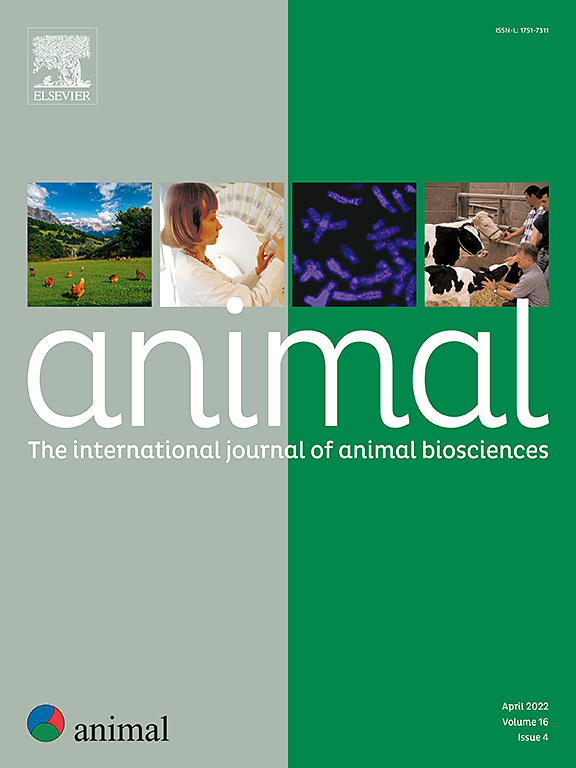公众对奶牛犊牛微生物组管理策略的接受程度:关于牛初乳、益生菌供应和奶牛与犊牛长时间接触的欧洲调查。
IF 4
2区 农林科学
Q1 AGRICULTURE, DAIRY & ANIMAL SCIENCE
引用次数: 0
摘要
微生物群在小牛生命的早期阶段起着至关重要的作用。可以考虑采取几种管理措施来促进犊牛微生物群的发育和组成。然而,他们的社会接受程度在很大程度上是未知的。本研究的目的是调查公众对旨在改善小牛健康和福利的创新微生物组管理实践的接受程度,并评估影响这些接受程度的因素。分析中使用的数据来自于2023年7月进行的一项在线调查。最终样本包括来自四个欧盟国家的3220名公民(芬兰= 813,法国= 803,爱尔兰= 801,波兰= 803)。参与者被要求评估四种旨在改善小牛健康和福利的管理方法:(1)使用初乳,(2)提供混合益生菌粉,(3)提供益生菌酸奶或开菲尔,(4)长时间的牛-小牛接触。参与者被提供了不同程度的信息:一组只收到了干预措施的简短描述,而另一组既收到了干预措施的描述,也收到了干预措施的潜在成本和环境影响等方面的信息。参与者被要求按照1到5的标准尺度对接受度进行评分,1表示“非常同意”,5表示“非常不同意”。此外,参与者还被问及他们的社会人口背景(如年龄、教育程度)。他们还被要求提供他们对农业和微生物组的熟悉程度、食品安全、环境意识、成本考虑和消费乳制品的文化观点等各个方面的观点。所得数据采用普通最小二乘回归模型进行分析。调查结果显示,在所有国家的测试干预措施中,长时间的牛-小牛接触是最可接受的措施(79%的应答者同意或强烈同意)。态度和社会经济变量被发现在研究的管理策略中有不同的影响。例如,对农业系统和微生物组更熟悉的个体更倾向于接受所有四种干预措施,而与男性相比,女性对长时间的牛-小牛接触表现出更高的接受度。结果还表明,向参与者提供额外的信息与对这些措施的接受程度的降低有关。总之,公众对奶牛微生物组管理策略的看法受到复杂因素的影响。此外,我们的讨论强调了信息清晰和透明的重要性,科学知识的道德传播,以及平衡和连贯沟通的必要性。本文章由计算机程序翻译,如有差异,请以英文原文为准。
Public acceptance of microbiome management strategy in dairy calves: a European survey on colostrum, probiotic provision and prolonged cow-calf contact
The microbiome plays a crucial role in the calves’ early stages of life. Several management practices can be considered to enhance the development and composition of the microbiome in calves. However, their social acceptance is largely unknown. The aim of this study was to investigate the public acceptance of innovative microbiome management practices aimed at improving the health and welfare of calves and to assess the factors influencing these levels of acceptance. Data used in the analysis were obtained from an online survey conducted in July 2023. The final sample consists of 3 220 citizens from four EU countries (Finland = 813, France = 803, Ireland = 801 and Poland = 803). Participants were asked to assess four management practices designed to improve calves’ health and welfare: (1) using colostrum, (2) providing mix probiotics powder, (3) providing probiotics as yogurt or kefir and (4) prolonged cow-calf contact. Participants were provided with different levels of information: one group received only a short description of the intervention, while the other group received both the intervention description and information on aspects such as potential costs and environmental impact of the intervention. Participants were asked to rate the acceptance on a standardised scale ranging from 1 to 5, with 1 indicating “strongly agree” and 5 indicating “strongly disagree”. Additionally, the participants were questioned about their socio-demographic background (e.g. age, education). They were also asked to provide their perspectives on various dimensions concerning familiarity with farming and microbiome, food safety, environmental awareness, cost consideration, and cultural perspective of consuming dairy products. Obtained data were analysed using the ordinary least squares regression model. The findings reveal that prolonged cow-calf contact was the most acceptable measure among tested interventions in all countries (79% of responders agreed or strongly agreed). Attitudinal and socio-economic variables were found to have a differential effect across the studied management strategies. For instance, individuals with greater familiarity with farming systems and microbiomes were more inclined to accept all four interventions, while women, compared to men, showed higher acceptance of prolonged cow-calf contact. Results also indicate that the provision of additional information to the participants was associated with a decrease in the acceptance of the measures. In conclusion, the public’s perceptions regarding microbiome management strategies in dairy calves are shaped by complex factors. Also, our discussion emphasises the importance of clarity and transparency of messages, ethical dissemination of scientific knowledge, and the necessity for balanced and coherent communication.
求助全文
通过发布文献求助,成功后即可免费获取论文全文。
去求助
来源期刊

Animal
农林科学-奶制品与动物科学
CiteScore
7.50
自引率
2.80%
发文量
246
审稿时长
3 months
期刊介绍:
Editorial board
animal attracts the best research in animal biology and animal systems from across the spectrum of the agricultural, biomedical, and environmental sciences. It is the central element in an exciting collaboration between the British Society of Animal Science (BSAS), Institut National de la Recherche Agronomique (INRA) and the European Federation of Animal Science (EAAP) and represents a merging of three scientific journals: Animal Science; Animal Research; Reproduction, Nutrition, Development. animal publishes original cutting-edge research, ''hot'' topics and horizon-scanning reviews on animal-related aspects of the life sciences at the molecular, cellular, organ, whole animal and production system levels. The main subject areas include: breeding and genetics; nutrition; physiology and functional biology of systems; behaviour, health and welfare; farming systems, environmental impact and climate change; product quality, human health and well-being. Animal models and papers dealing with the integration of research between these topics and their impact on the environment and people are particularly welcome.
 求助内容:
求助内容: 应助结果提醒方式:
应助结果提醒方式:


